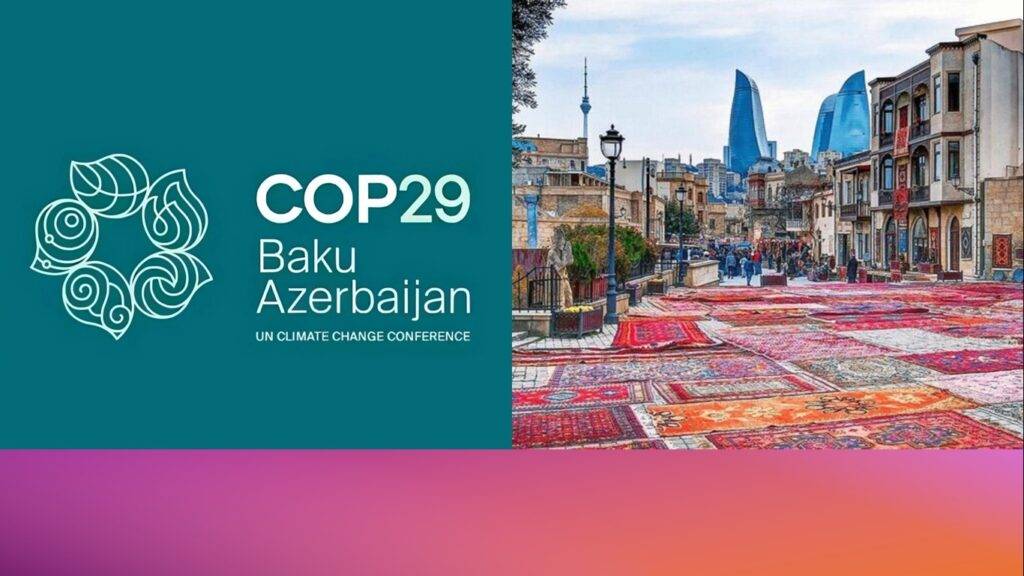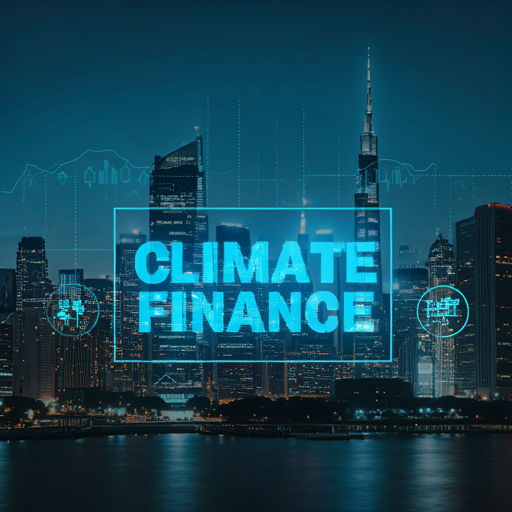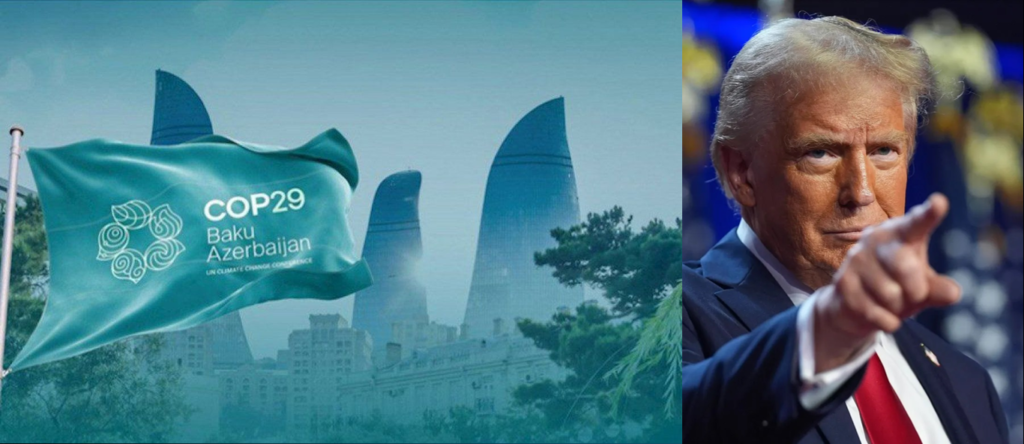COP-29 in Baku: A Global Call for Climate Financing
The 29th UN Conference of the Parties (COP-29) will take place from November 11 to 22, 2024.They will hold it in Baku, Azerbaijan. Mukhtar Babayev, the Minister of Ecology and Natural Resources of Azerbaijan, will preside over the conference. The conference will bring together global leaders, business figures, and civil society representatives. The focus will be on addressing escalating global temperatures and their widespread impacts.
A central focus of COP-29 will be climate financing. Countries recognize the need for trillions of dollars. This is to reduce greenhouse gas emissions. It will involve shifting towards green technologies and minimizing industrial outputs. Nations will update their national action plans and present them. These plans are under the Paris Agreement. Deadlines are approaching in early 2025.

From COP-28 to COP-29: Milestones in Global Climate Progress
The Conference of the Parties (COP) comprises the nations that signed the United Nations Framework Convention on Climate Change (UNFCCC) in 1992. The aim is to stabilize greenhouse gas emissions at levels that are not disastrous for human life. The summit is conducted every year. COP-28 was held in Dubai. It marked the largest gathering in COP history. The event drew 97,000 delegates and 150 heads of state. A key outcome from COP-28 was the first-ever Global Stocktake. This was a milestone review assessing progress toward the goals of the 2015 Paris Agreement.
Azerbaijan’s Climate Ambitions and Controversies as COP-29 Host
In 2017, Azerbaijan ratified the Paris Agreement under the UN Framework Convention on Climate Change. They announced the country as the host of COP-29 in 2023. Mukhtar Babayev will lead the conference in January 2024.
Azerbaijan launched the Climate Finance Action Fund in Baku in July 2024. The fund aims to secure $1 billion in annual contributions from global fossil fuel-producing nations and companies. Its purpose is to invest in renewable energy and support developing countries in combating the impacts of global warming through climate-focused projects. Due to the frequent climate-related disasters worldwide, the fund allocates 20% to a Rapid Response Funding Facility. Consequently, this facility will support disaster relief efforts.
However, Azerbaijan’s role in COP-29 has not been without criticism. The country, a major fossil fuel exporter, faces scrutiny, along with allegations of corruption involving political elites. For example, the Azerbaijani government reportedly awarded a COP-29 hosting contract in Baku to Emin Agalarov, the former son-in-law of President Ilham Aliyev, without a competitive bidding process. As a result, human rights organizations, including Amnesty International, urge Azerbaijan to protect and respect human rights during COP-29.
COP-29 in Azerbaijan: Key Agendas and Global Expectations
As with previous COP conferences, COP-29 in Azerbaijan has set high expectations globally, focusing on the following key agendas:
Tensions Over Climate Finance: Funding Commitments at Stake
Analysts are calling COP-29 the “Climate Finance COP.” The primary focus will be on finances. The New Collective Quantified Goal is a new annual climate financing target. They set the deadline for the pledge at the end of this year. Countries have only met the existing $100 billion pledge intermittently since 2020. The upcoming conference in Azerbaijan aims to raise the $100 billion target. As in previous years, countries are likely to engage in debates.
These debates will focus on financial contributions. Developed nations will emphasize the need to sustain their industrial sectors due to high demand. Meanwhile, developing countries will call for increased funding, citing their vulnerability to climate-related disasters. Analysts anticipate that global multilateral negotiations will make the climate finance process more complex. Any progress will require consensus among the parties involved.

Fossil Fuel Transition
At COP-28, for the first time, parties agreed on the transition from fossil fuels to sustainable energy systems. However, fossil fuel production continues unabated around the world. Critics argue that while COP-29 may push countries toward commitment, it may not lead to practical implementation of the transition. Countries will focus on increasing renewable energy production to reduce their reliance on fossil fuels.
Establishing Rules for Carbon Markets
The Paris Agreement allocates a specific emissions quota to each party, which they must not exceed. When developed countries surpass their emissions cap, they often purchase additional quotas from nations that remain below their allocated limits. COP-29 will set the rules for the carbon market to ensure transparent carbon trading. The Paris Agreement Crediting Mechanism will define this mechanism, aiming to streamline and regulate emissions trading globally.

Tracking Progress on Emissions and Climate Funding
At COP-29, Azerbaijan will present its first Biennial Transparency Report, which outlines the country’s progress in limiting greenhouse gas emissions and identifies the steps needed to meet its targets. The report will also detail the financial resources required to address climate challenges. It is unclear how many other countries will submit their reports before the December 31 deadline, but analysts expect that the overall progress of the parties will remain limited.
Adaptation Guidelines
At COP-28, parties adopted a framework of guidelines to help countries adapt to climate challenges, including disasters. However, these guidelines lacked specific details on how to measure progress or implement strategies to protect populations from climate hazards. COP-29 is likely to expand on this framework. It will provide more concrete details on adaptation efforts. It will also improve strategies that enhance resilience and safety.
Addressing Loss and Damage in Developing Countries
At COP-27, they established the Fund for Responding to Loss and Damage to provide financial support to countries facing severe natural hazards. To date, they have allocated approximately $660 million. However, as natural disasters’ frequency and severity continue to rise, developing countries are expected to demand a larger share of the funds to address the growing impact of climate-related events.
Climate Negotiations at COP-29: Key Blocs and Their Agendas
United Nations conferences are driven by negotiations. Each country seeks support for its stance from other nations. Similarly, COP negotiations are organized into various blocs. These blocs are not exclusive but depend on each country’s decision to join. One major bloc is The Group of 77 and China. It includes most developing nations and holds significant influence in climate change discussions. The bloc’s key agenda for COP-29 focuses on ensuring a steady flow of financial resources from developed countries to climate funds. Another important group is the Lead Developed Countries Group. It consists of 46 countries that are particularly vulnerable to climate change.
This group often opposes the policies of more industrialized nations regarding climate action. The Small Island States group represents nations highly vulnerable to rising sea levels and other climate threats. They will push for increased climate financing at COP-29. The African Group represents all African states. It aims to secure agreements on carbon market trading and increased financial support for climate adaptation. Additionally, smaller groups, such as the Environmental Integrity Group, contribute to the negotiations. Each of these smaller groups has its own climate-related priorities.
US Politics and COP-29: Challenges to Climate Action Under Trump
With Donald Trump’s election as the 47th President of the United States, concerns have arisen about the potential outcomes of COP-29. As one of the largest consumers of fossil fuels, the United States plays a crucial role in curbing greenhouse gas emissions. However, since Trump’s first presidency, the country has taken a step back from international climate agreements. Notably, Trump withdrew the US from the 2015 Paris Climate Agreement, and there are growing speculations that the US may even consider exiting the UN Framework Convention on Climate Change, which it ratified in 1992.

Shifting Climate Leadership: US Withdrawal Boosts China and EU’s Role
With Donald Trump’s return to power, global climate leadership has once again shifted towards China and the European Union, both of which are major greenhouse gas emitters. The EU has expressed concerns over China’s efforts, believing that it has not done enough to curb emissions. On the other hand, China is focused on carbon border taxes and trade restrictions that could negatively impact developing nations. The EU’s carbon border policy, set to impose fees on imports of high-carbon goods like steel starting in 2026, has faced strong criticism from various countries, including developing ones, for its potential to harm their economies.

To conclude, as COP-29 in Azerbaijan approaches, the discussions are set to focus heavily on climate finance, with countries aiming to address the gap in funding required for mitigating climate change and adapting to its impacts. The New Collective Quantified Goal (NCQG) is expected to take center stage, with developing nations pressing for a significant increase in financial support, potentially reaching $1 trillion annually by 2035. In addition to climate finance, key issues such as the transition away from fossil fuels, carbon market regulations, and loss and damage funding will be central to the negotiations.
Despite challenges, there is a growing recognition that innovative financial mechanisms, such as carbon trading and new taxes on high-carbon activities, will play a role in bridging the funding gap. With the influence of major emitters like China and the EU, and the shifting dynamics under the leadership of Donald Trump, COP-29 will be a pivotal moment in shaping the future of global climate action.
